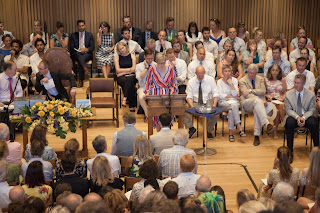 As
another school year comes to an end, Sarah Thomas looks ahead to the future with
one foot firmly rooted in the past. Discover why she believes that Bryanston’s
motto of “Et Nova et Vetera” – both the new and the old – is more apt than
ever.
As
another school year comes to an end, Sarah Thomas looks ahead to the future with
one foot firmly rooted in the past. Discover why she believes that Bryanston’s
motto of “Et Nova et Vetera” – both the new and the old – is more apt than
ever.
Back
in January, Bryanston turned 90 and through OB Simon Wheeler’s (C ’93)
extraordinary series of films, we are able to look back and remind ourselves of
why this school is so special. The place, the people, the ideas and the principles
that continue to guide us. In June, we were able to look forward, with the
announcement of my successor. I’m
delighted that Mark Mortimer will be leading Bryanston onwards and upwards from
September 2019 and look forward to having a year in which I can do whatever
makes most sense to allow him, his lovely wife Anna and their three children,
to get to know this wonderful school.
 |
| Speeches in the Elder Concert Hall |
At
last year’s Speech Day, the Chairman spoke on the theme of necessary change and
evolution within schools. Schools do change.
They must; they would disappear into oblivion if they did not. But that does not mean that the things that
matter must change. Our guiding principles of creativity, breadth of ambition, individuality, the sense of a
loving family, of humanity, and of resilience, have been embedded in our DNA
since 1928 and will endure, I am certain, because of Bryanston’s collective
good sense, the quality of the governors, and their choice of excellent headmasters.
Those guiding principles will ensure that Bryanston continues to evolve boldly
and positively, without losing the critical constituents of what makes
Bryanston Bryanston.
Peter
Tait, former headmaster of Sherborne Prep and a great friend of Bryanston,
likes to torment us with this question: ‘What is a proper curriculum?’ Are we
still, in effect, teaching what we taught 50 years ago, regardless of new, more
relevant subjects, and without reference to what our pupils actually learn from
them? Teaching is not after all
learning. Then there are the real-world
issues: funding for state schools and affordability for the independent sector;
the fact that more overseas children are now educated in branches of UK independent
schools abroad than here in the UK; and above all there’s the looming threat of
AI. What kind of world are we actually preparing our young people for? And how
do independent schools – how does Bryanston
– stay relevant in the face of the fantastically significant changes that
are coming our way?
 |
| Duncan Emerson directs the orchestra |
Sir
Anthony Seldon in his book The Fourth
Education Revolution challenges the model which most schools still adhere
to – that of The Third Revolution: industrialised
learning; schools as factories; chalk and talk, or its 21st-century
equivalent, Powerpoint and talk. Sir
Anthony predicts we will meet the challenges of AI by adopting a new model and following
a 5-point plan: (i) ending early specialisation in schools; (ii) investing in
staff who understand learning and analytics and technology; (iii) emphasising
the human in education, to produce
competent adults who are better than any algorithm; (iv) personalising learning;
(v) challenging and stretching young people, by making school more than about
lessons.
 |
| Guests relax in the sunshine |
This
is precisely the model that Bryanston has striven to follow, and with some success,
over the past 90 years, often in defiance of the conventional wisdom that academic success is the be all and end all. Ending early specialisation? Embracing personalised
learning? Stretching our pupils beyond the classroom? Look at our tutorial
system and the Dalton Plan, our correction periods and one-to-one attention to
the individual. Added to that, we have a
curriculum that is particularly diverse in the formative D year, an
extraordinary range of extra-curricular opportunities and an A level programme which
always seeks to ensure there are no impossible subject combinations. And better
still, the IB.
 |
| Tennis on the grass courts |
Bryanston’s
model has explicitly set out to help children to develop the human. It’s why Bryanstonians invariably end up in
such a range of careers and don’t necessarily
trot off into those professions which, we are told, will soon no longer exist.
At Bryanston we have always known that education is not about mere subjects. It’s about an outlook, an attitude, a lifelong
ability to learn and adapt; to work in teams; to influence and persuade; to
direct and lead. To laugh at yourself and to put things right when you’ve gone
wrong. The future requires real people, with real values and real emotional
intelligence. And real education.
Whilst
the changes technology have brought have been huge (both for good and bad) I am
happy to predict that one of the longer terms effects might be that we refocus upon, and rejoice in, what makes us human,
not machine. Because the world changes – we all know that – but what does not
change is what it takes to be human.
 As
another school year comes to an end, Sarah Thomas looks ahead to the future with
one foot firmly rooted in the past. Discover why she believes that Bryanston’s
motto of “Et Nova et Vetera” – both the new and the old – is more apt than
ever.
As
another school year comes to an end, Sarah Thomas looks ahead to the future with
one foot firmly rooted in the past. Discover why she believes that Bryanston’s
motto of “Et Nova et Vetera” – both the new and the old – is more apt than
ever. 



